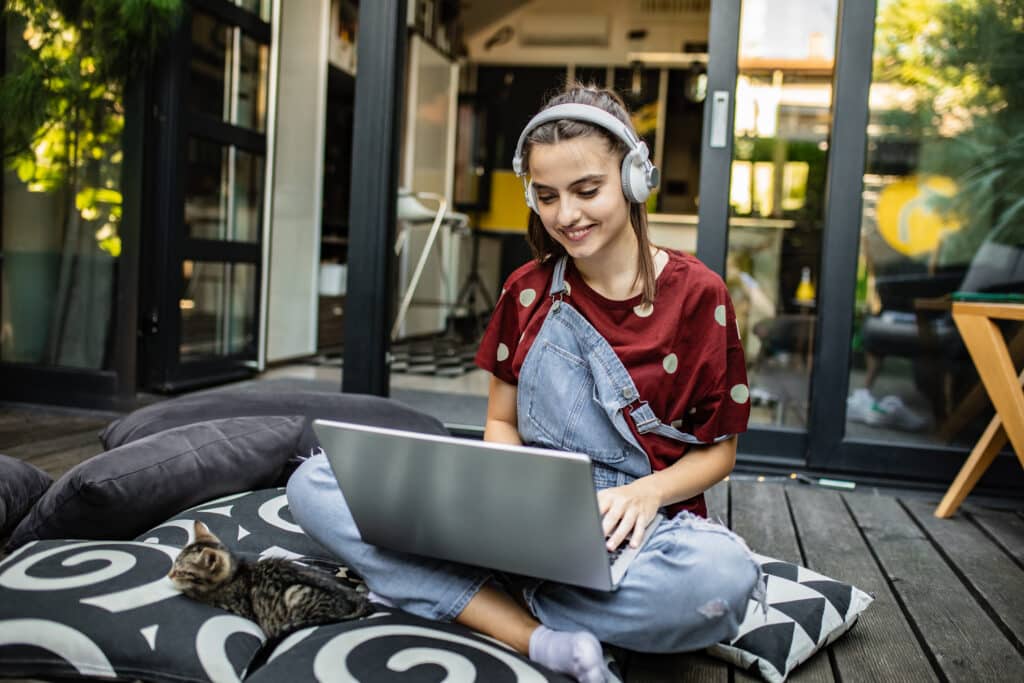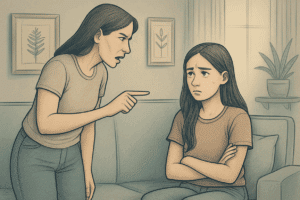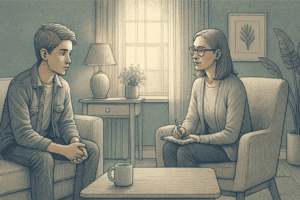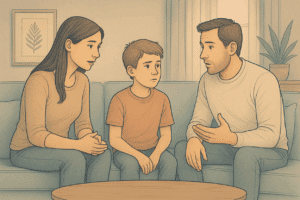Social media has woven itself into the fabric of our everyday lives. We scroll through feeds, share moments, and connect with people across the globe—all at the touch of a button.
While social media has many perks, it also has a darker side, particularly when it comes to mental health. Have you ever caught yourself feeling more anxious or down after spending time online? You’re not alone.
In this blog, we’ll dive into the different ways social media can impact your mental well-being, from increasing feelings of depression and anxiety to affecting sleep and even leading to addiction.
Social Media and Depression: The Comparison Trap
We’ve all been there—scrolling through Instagram or Facebook, seeing everyone else’s seemingly perfect lives, and feeling like we don’t measure up. Social media can create a distorted reality, where we’re only seeing the highlight reels of others’ lives.
This can lead to the infamous comparison trap, where you start to measure your own worth against what you see online.
When you constantly compare yourself to others, it’s easy to feel inadequate. This feeling of inadequacy can lead to depression, especially if you’re already struggling with self-esteem issues. In fact, heavy social media use is linked to an increase in depressive symptoms, particularly among young people. The constant barrage of “perfect” images and success stories can make it feel like everyone else is living a better life than you are, which is simply not true. Remember, social media is often a carefully crafted version of reality, not the whole picture.
Anxiety and Social Media: The Pressure to Be “On”
Social media doesn’t just affect how you feel about yourself; it can also heighten feelings of anxiety. The pressure to present a perfect image online can be overwhelming. From choosing the right filter to crafting the perfect caption, every post can feel like a performance.
This need for approval through likes, comments, and shares can create a cycle of anxiety. You might find yourself constantly checking your phone, worrying about how your latest post is being received.
Beyond the pressure to curate a flawless online presence, social media can also lead to information overload. With so much content coming at you from all directions, it’s easy to feel overwhelmed.
This can contribute to feelings of anxiety, as your brain struggles to process everything at once. Whether it’s keeping up with the latest trends or staying informed about world events, the constant stream of information can leave you feeling frazzled and mentally exhausted.
Social Media Addiction: When Scrolling Becomes a Habit
Social media addiction is a growing concern, particularly as platforms become more sophisticated in keeping you engaged. Ever notice how time flies when you’re scrolling through TikTok or Instagram? These apps are designed to capture your attention and keep you coming back for more. But this can turn into a habit that’s hard to break.
Social media addiction can manifest in different ways. You might find yourself reaching for your phone first thing in the morning, or feeling restless if you haven’t checked your notifications in a while.
Over time, this compulsive behavior can interfere with your daily life, affecting your work, relationships, and even your physical health. The constant need to be connected can leave you feeling drained and disconnected from the real world.
Sleep Problems: How Social Media Disrupts Your Rest
Another way social media can impact your mental health is by disrupting your sleep. Have you ever found yourself staying up late, scrolling through your phone when you should be winding down for bed? You’re not alone. Many people fall into the trap of using social media right before bed, which can have a negative impact on sleep quality.
The blue light emitted by screens can interfere with your body’s natural sleep-wake cycle, making it harder to fall asleep and stay asleep. This can lead to insomnia or poor-quality sleep, which in turn affects your mood and mental health. Lack of sleep can make you more irritable, anxious, and prone to depression.
Moreover, the content you consume before bed can also affect your sleep. If you’re scrolling through stressful or upsetting posts, it can be harder to relax and drift off to sleep. On the flip side, you might find yourself staying up late because you’re too engrossed in what’s happening online to put your phone down. Either way, your mental health can take a hit when your sleep is compromised.
The Fear of Missing Out (FOMO): A Modern-Day Anxiety
Fear of Missing Out, or FOMO, is another mental health issue linked to social media. FOMO is the anxiety that arises when you feel like you’re missing out on something important—whether it’s a social event, a trend, or even just a conversation happening online. Social media amplifies this fear, as you’re constantly bombarded with updates about what everyone else is doing.
FOMO can lead to feelings of inadequacy, loneliness, and anxiety. You might find yourself constantly checking your phone to make sure you’re not missing anything, which can make it hard to focus on the present moment. This can create a sense of dissatisfaction with your own life, as you start to believe that everyone else is having more fun or achieving more than you are.
Over time, FOMO can contribute to a cycle of anxiety and depression. The constant need to be in the know can leave you feeling mentally and emotionally drained, making it harder to enjoy your own experiences.
Cyberbullying: The Dark Side of Social Interaction
Social media provides a platform for connection, but it also opens the door to negative interactions, such as cyberbullying. Unlike traditional bullying, which typically happens in person, cyberbullying can occur 24/7 and follow you wherever you go. This can make it difficult to escape the harassment and can have a severe impact on your mental health.
Victims of cyberbullying often experience anxiety, depression, and low self-esteem. The anonymity of social media allows bullies to say things they might not say in person, which can make the attacks even more hurtful. The public nature of social media also means that these negative comments can be seen by a wide audience, amplifying the humiliation and distress.
Social Media and Body Image: The Pressure to Look Perfect
Body image is another area where social media can have a significant impact on mental health. With the rise of influencers and the emphasis on physical appearance, it’s easy to fall into the trap of believing that you need to look a certain way to be accepted or valued.
Platforms like Instagram are filled with images of “perfect” bodies, often edited and filtered to look flawless. This can create unrealistic beauty standards that are impossible to achieve in real life. For many people, especially young women, this can lead to body dissatisfaction, low self-esteem, and even eating disorders.
The pressure to look perfect can also contribute to anxiety and depression. You might find yourself obsessing over your appearance or comparing yourself to others, leading to negative feelings about your own body. It’s important to remember that social media often presents a distorted version of reality, and that your worth is not determined by your appearance.
Social Isolation: The Paradox of Connection
One of the biggest ironies of social media is that while it’s designed to connect us, it can also lead to feelings of isolation. It’s easy to get caught up in online interactions and neglect real-life relationships. Over time, this can lead to social isolation, as you spend more time online and less time engaging with the people around you.
Social isolation can have a serious impact on mental health, leading to feelings of loneliness, depression, and anxiety. While social media can provide a sense of connection, it’s no substitute for face-to-face interactions.
Social Media and Self-Worth: The Validation Game
Another aspect of social media that can impact mental health is the need for validation. Many people use social media as a way to seek approval from others, whether it’s through likes, comments, or followers. While it’s natural to want to be liked and accepted, relying on social media for validation can be harmful to your self-worth.
When your self-esteem is tied to how many likes or comments you receive, it can lead to feelings of inadequacy when those numbers don’t meet your expectations. This can create a cycle of seeking validation online, which can be difficult to break.
Managing Social Media Addiction: Practical Tips for a Healthier Balance
While the effects of social media on mental health can be concerning, it’s important to remember that there is hope and help available. If you’re struggling to manage your social media usage, know that you’re not alone, and there are effective strategies to regain control and find a healthier balance. The tips and solutions outlined below are designed to empower you to make mindful choices and create a more positive digital environment. By taking proactive steps, you can mitigate the negative impacts of social media and foster a more fulfilling and balanced life.
1. Set Clear Boundaries One effective way to manage social media addiction is by setting clear boundaries for its use. Establish specific times during the day when you allow yourself to check social media, and stick to these times. For instance, you might decide to check your social media accounts only in the morning and evening. By limiting your access, you can reduce the temptation to mindlessly scroll throughout the day.
2. Create Tech-Free Zones Designate certain areas of your home as tech-free zones, such as the dining room or bedroom. This can help you disconnect from your devices and foster more meaningful in-person interactions. By creating these zones, you can also improve your sleep quality and reduce the urge to engage with social media during quiet or reflective times.
3. Use Apps to Monitor and Limit Usage Several apps and tools can help you monitor and limit your social media usage. Applications like Screen Time (iOS) or Digital Wellbeing (Android) provide insights into how much time you spend on different apps and offer features to set daily limits. These tools can help you become more aware of your usage patterns and encourage you to take breaks when needed.
4. Engage in Offline Activities Find activities that you enjoy and that do not involve screens. Engaging in hobbies like reading, exercising, or spending time with friends and family can help reduce your reliance on social media for entertainment and connection. By rediscovering offline interests, you can create a more balanced lifestyle and reduce the urge to turn to social media out of habit.
5. Practice Mindfulness and Self-Awareness Mindfulness techniques can help you become more aware of your social media habits and their impact on your mental well-being. Practice mindfulness by paying attention to your feelings and reactions when using social media. Notice if you feel anxious, stressed, or unhappy, and use this awareness to make more intentional choices about your social media use.
6. Curate Your Feed Take control of the content you see by curating your social media feed to include more positive and uplifting content. Unfollow or mute accounts that contribute to negative feelings or stress. Follow accounts that inspire, educate, or make you feel good about yourself. A well-curated feed can enhance your online experience and support your mental health.
7. Take Regular Breaks Consider taking regular breaks from social media to give yourself a chance to reset. You might start with a short break, such as a weekend or a week, and see how it affects your mood and well-being. During this time, focus on other aspects of your life and evaluate how you feel without the constant presence of social media.
8. Seek Professional Support If you find that managing social media use on your own is challenging, consider seeking support from a mental health professional. Therapists and counselors can provide guidance and strategies for coping with social media addiction and its impact on your mental health. They can also help you develop healthier habits and improve your overall well-being.
Implementing these practical tips and solutions, can help you take proactive steps to manage social media addiction and foster a healthier relationship with technology. Remember, finding balance is key to ensuring that social media enhances rather than detracts from your quality of life.
Conclusion: Finding Balance in a Digital World
Social media is a powerful tool that can connect us, inspire us, and provide us with endless entertainment. However, it’s crucial to be mindful of its potential impact on mental health. From contributing to depression and anxiety to disrupting sleep and fostering addiction, social media can take a toll on well-being if not managed carefully.
At Mission Prep we work closely with teens to help them develop a healthy relationship with social media and technology. We believe that by taking control of how they show up online, how they interact with others, and how much time they spend on social media, they can significantly improve their mental health and overall quality of life. The key is to find a balance. Be aware of how social media affects your mood and mental health, and take proactive steps to manage your usage. This might involve setting boundaries around screen time, curating your feed to include more positive content, or even taking breaks from social media. Remember, your mental health is more important than any online presence. Taking care of yourself in the digital world is just as essential as taking care of yourself in the real world.


















